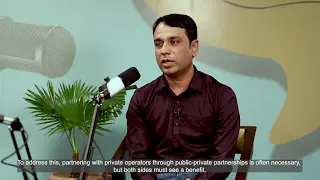With rapid urbanisation in Bangladesh, over 30% of the population now lives in urban areas, but sanitation infrastructure often struggles to keep pace. While toilet access has improved, most households still rely on on-site sanitation systems like pit latrines and septic tanks. This makes effective faecal sludge management (FSM) vital for public health and environmental protection. Faecal Sludge Treatment Plants (FSTPs) are emerging as a key solution for treating waste from these systems. However, many FSTPs face challenges in operation, sustainability, and impact due to technical, financial, and institutional barriers. In this episode, we explore the pressing issues affecting FSTPs in Bangladesh. We discuss human resource constraints, equipment problems, funding shortages, and weak regulation. The conversation highlights practical innovations in technology and financing, including modular systems and public-private partnerships, as well as the importance of better coordination among municipalities, private operators, and communities. Guest: Fariduzzaman Shapon - Programme Manager, Practical Action in Bangladesh Host: Samia Anwar Rafa - Technical Officer, WaterAid Bangladesh Last episode of the 7-episode discussion series "Faecal Sludge Management for Sustainable Sanitation" presented by Practical Action in Bangladesh in collaboration with Bangladesh FSM Network
3 August, 2025
Episode 6: Towards Safer Working Conditions for Sanitation Workers in Bangladesh
Bangladesh has made significant strides in sanitation, but the health and safety of sanitation workers remain a major concern. Many workers, including pit emptiers and waste handlers, labour without adequate protection, training, or access to healthcare, leaving them vulnerable to illness and injury. Tragically, some have lost their lives while carrying out these essential duties. A large number of sanitation workers belong to marginalised communities such as the Horijon and Dalit, and often lack formal employment rights, insurance, or social security.


No comment yet.